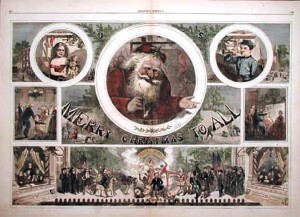Reports from Baltimore of a rebel incendiary plot to burn northern cities and the recent incendiary fire in New York City prompted Mayor Caven to issue a warning to the people of Indianapolis that “an attempt to burn the city will be made.” Precautions were to be taken to “see that pumps and wells are in order, and every appliance for the extinguishment of fire be ready.” Large establishments and depots were to post night guards; “Let citizens be vigilant and watchful.”
In the early days of the month, lists of paroled Indiana prisoners arriving in Annapolis from camps in the South began to appear along with column after newspaper column in the Journal headlined, “OUR PRISONERS – THEIR RELEASE FROM CAPTIVITY – HORRIBLE BARBARITIES OF THE REBELS.” Detailed official reports provided horrific accounts of the appalling conditions in which federal prisoners were kept at Andersonville, Georgia – “The men were without shelter and in many instances almost naked” – “Constantly drenched in rains, receiving bad food” – “Under these circumstances the mortality became frightful” – “11,000 victims had been buried, uncoffined, in shallow trenches” – “The cruelty of Captain Wertz, the rebel office in charge, all the prisoners recall in unmeasured terms.” In our city, Camp Morton received 1,700 additional rebel prisoners a week before Christmas.
Small groups of refugee families – “the destitute…from the desolated homes of the South” – formed “painful sights” around the old Madison Railroad depot and the Gas Works. To help ease the sufferers until some plan could be adopted to care for these cases, Col. James Blake collected donations of clothing and money. Later, members of Christ Church formed the Refugee Relief Association, under the leadership of Gen. John Love, to provide “shelter, clothing, food, medicine…and to aid, as far as possible, in mitigating the sufferings of this unfortunate class of our countrymen.” The city’s Jewish Soliciting Committee, under the direction of Moses Solomon, contributed $1,500.00 (2013: $22,040.29) in clothing to the urgent needs of whole communities of Southern refugees who have been sent to Cairo, Illinois on steamers by Union military authorities. This generous donation came primarily from a synagogue whose members “number but little over 50, and the whole Jewish population of this city but little more than 200.”
Indiana’s thirteen Presidential Electors met at the State House on Wednesday, December 7 in the Hall of the House of Representatives and cast thirteen votes for Abraham Lincoln for President and thirteen votes for Andrew Johnson for Vice President. By lot, Elector Benjamin F. Claypool of Connersville was elected messenger to carry the vote of the Indiana electors to Washington, DC.
Those citizens with incomes above $600 (2013: $11,196.47) per year who were subject to the 5 percent special war income tax of 1863 are listed, as a matter of public record, on the books in the Indianapolis Assessor’s Office, U. S. Internal Revenue. Since these names show the “prosperity of our city,” the Journal concluded to publish them noting that many “cannot take the time to go to see the books.” The wealthiest paying the tax were bankers Calvin Fletcher, Sr. who paid $1,806.90 (2013: $26,549.73) and Stoughton A. Fletcher, Sr. who paid $1,281.70 (2013: $18,832.69). Two modest citizens, R. S. Cow and C. S. Dodson paid only 35ȼ (2013: $5.14) each in tax.
The names of Indiana killed and wounded at the Battles of Franklin, Nashville, and Murfreesboro, Tennessee brought the war to many Hoosier homes. The 21st Indiana Battery, “composed of good and brave men, who will give a good account of themselves,” received its orders and left for the front. Miss Lou Emma Hume, the Western Traveling Agent for the United Service Magazine, was in the city soliciting subscriptions. The periodical is “the best literature of the war – a condensed history of the operations in the field.”
Newcomb’s Minstrels entertained an “overflowing audience” at Masonic Hall while the “great American Tragedian” Joseph Proctor appeared in Macbeth at the Metropolitan Theater. Later in the month Prof. McAllister, the “most popular Prestidigitateur in America,” distributed 150 Christmas presents at the opening of his Salon Diabolique and Floral Mirror of Wonders at Masonic Hall. Among the local seasonal entertainments were the Third Church Festival where those attending enjoyed hot coffee, oysters, and ice cream and the first annual Calico Dress Ball of the Ladies Hebrew Benevolent Society where about midnight a “sumptuous repast was served up” to the 125 couples in attendance.
On the afternoon of December 23, three bounty jumpers were executed at Camp Burnside – Charles Billingsly, who also passed by the name Cooper and Miller had enlisted and deserted numerous times; Thomas Ryan or John Reagan admitted he had jumped the bounty thirty times; and Thomas Murray claimed he “didn’t know the consequences of desertion.” Sitting on their coffins, the three were shot dead by the firing squad ending a “strange and fearful scene, which Indiana has never, and [it is hoped] may never see a parallel to.” President Lincoln postponed the execution of a fourth man John Doyle, alias Lemon for ten days. Pursuant to a call by the President for 300,000 volunteers to serve one year, Gov. Morton authorized the formation of eleven infantry regiments, one from each Congressional district.
Children and adults assembled for Christmas Eve festivities at the Third Presbyterian Church where a large brilliantly illuminated evergreen loaded with presents stood near the pulpit. At the English Lutheran Church, a fur clad Santa Claus left candies and nuts for the children.



